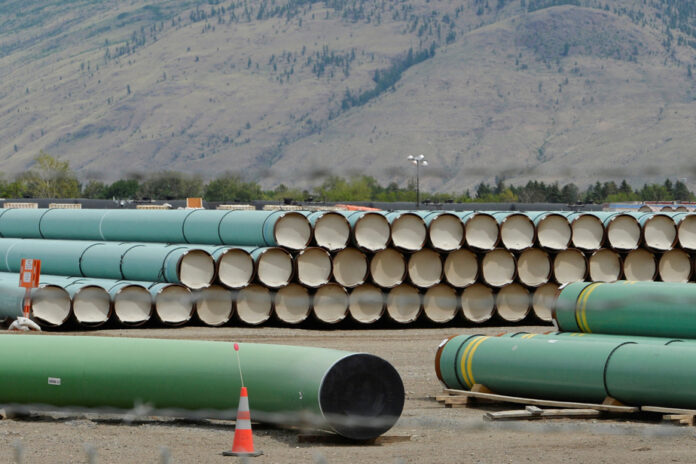(Calgary) The Canada Energy Regulator (CER) Commission has approved Trans Mountain’s request to reroute the pipeline, a move that could save the government-owned pipeline project from an additional nine delays month.
The regulator released its decision Monday, just a week after hearing in person arguments from Trans Mountain and a British Columbia First Nation that opposes the route change.
He did not communicate the reasons for his decision on Monday, specifying that they would be made public in the coming weeks.
By agreeing with Trans Mountain, the Canada Energy Regulator allows the pipeline company to slightly modify the route of a 1.3 kilometer section in the Jacko Lake region, near Kamloops, British Columbia, as well as the method of construction of this section.
Trans Mountain said it encountered technical difficulties in the area related to tunnel construction, and warned that sticking to the original route could result in a nine-month delay in completing the pipeline. , as well as an additional cost of 86 million for the project.
Trans Mountain hoped the pipeline would be completed by early 2024.
But Trans Mountain’s request encountered opposition from the Stk’emlúpsemc te Secwépemc nation, whose traditional territory is crossed by the pipeline, which had only agreed to the initial route.
In its regulatory filing, the First Nation argued that the area had “deep spiritual and cultural significance” for its people and that it only consented to the construction of the pipeline on the condition that Trans Mountain reduce the minimize surface disturbance by implementing specific trenchless construction methods.
The Stk’emlúpsemc te Secwépemc argued that Trans Mountain never said that the method of construction originally proposed was impossible, only that it could not be implemented in time to meet the in-service date of the pipeline, set for January 1.
The First Nation did not respond to a request for comment before publication time.
The Trans Mountain Pipeline is the only pipeline system in Canada that transports oil from Alberta to the West Coast. Its expansion, currently underway, will increase its capacity to 890,000 barrels per day (bpd), compared to 300,000 bpd currently.
The pipeline — which was purchased by the federal government for $4.5 billion in 2018 after previous owner Kinder Morgan Canada threatened to abandon the expansion project in the face of opposition from environmentalists and regulatory hurdles — has already faced construction challenges and delays.
Its projected cost has since skyrocketed: first to 12.6 billion, then to 21.4 billion, and most recently to 30.9 billion (the most recent estimate of the investment cost, as of March of this year).
Keith Stewart of Greenpeace Canada said it was alarming to see the regulator overriding the wishes of indigenous people in order to complete a pipeline on time.
“All Canadians should be outraged that our public regulator would allow a state-owned pipeline to break its promise to Indigenous people to protect lands of spiritual and cultural significance,” Stewart said.
The federal government has already approved a total of $13 billion in loan guarantees to help Trans Mountain secure the financing needed to cover cost overruns.
Trans Mountain has attributed its budget woes to a variety of factors, including inflation, COVID-19, labor and supply chain challenges, flooding in British Columbia and major archaeological discoveries unexpected events along the route.
Given that the Canadian regulatory system has a reputation for being slow and cumbersome, it was surprising to see the Canada Energy Regulator rule so quickly on the request to deviate the Trans Mountain route, said Richard Masson , lecturer at the school of public policy at the University of Calgary.
“This is a difficult decision to make when a $30 billion pipeline needs to be completed,” Masson said.
“If there’s no feasible way to build this tunnel, I guess that’s something to consider. »
Masson added that if the regulator had rejected Trans Mountain’s application, it would have been bad news for taxpayers as well as the federal government, which is seeking to divest itself of the pipeline and has already begun negotiations with several interested indigenous buyers.
It would also have been bad news for Canadian oil companies, which are eagerly awaiting the pipeline’s commissioning date to begin shipping barrels to their customers.
“If the pipeline can be completed by the end of the year and put into service in the first quarter, that’s good news. The world is still looking for oil, and oil prices are up at $90 a barrel,” Masson concluded.















